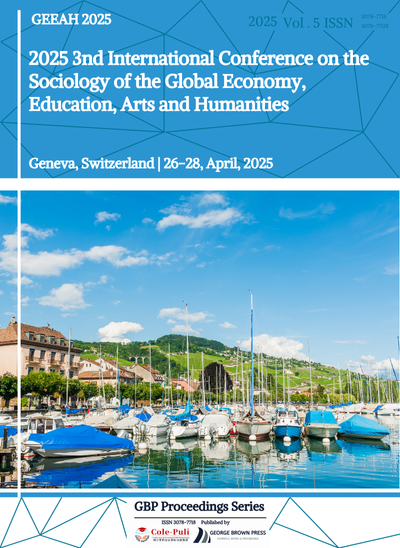Enhancing Intercultural Competence among College Foreign Language Students: The Critical Role of Educators
DOI:
https://doi.org/10.71222/vb68vr15Keywords:
intercultural competence, foreign languages, educators, national prideAbstract
This study investigates the intercultural competence of college students majoring in foreign languages, focusing on enhancement strategies and the pivotal role of educators. Based on a questionnaire survey of 122 undergraduates and qualitative interviews with two students, the findings reveal that teacher-guided discussions on foreign cultures, in comparison with Chinese culture, significantly foster students' cultural self-confidence and sense of national identity. Furthermore, classroom group discussions are found to be essential for improving interpersonal and oral communication skills. Assignments designed by instructors also promote critical thinking and creativity. Overall, the results highlight the importance of well-structured classroom activities and effective teaching methods in developing intercultural competence within foreign language education.
References
1. J. Li and E. Xue, "How talent cultivation contributes to creating world-class universities in China: A policy discourse analy-sis," Educ. Philos. Theory, vol. 54, no. 12, pp. 2008–2017, 2021, doi: 10.1080/00131857.2021.1965876.
2. D. Li and X. Chen, "Research on the Cultivation of International Talents in Colleges and Universities in the Context of the Belt and Road Initiative," in Proc. 2020 Int. Conf. Big Data Informatization Educ. (ICBDIE), Zhangjiajie, China, 2020, pp. 182–186, doi: 10.1109/ICBDIE50010.2020.00048.
3. C. Argyris, "Explorations in Interpersonal Competence-I," J. Appl. Behav. Sci., vol. 1, no. 1, pp. 58–83, 1965, doi: 10.1177/002188636500100105.
4. Y. Kim, "The identity factor in intercultural competence," in The SAGE Handbook of Intercultural Competence, D. K. Deardorff, Ed. Thousand Oaks, CA: SAGE, 2009, pp. 53–65. ISBN: 9781412960458.
5. S. Ting-Toomey, "Communicative resourcefulness: An identity negotiation perspective," in Intercultural Communication Competence, R. L. Wiseman and J. Koester, Eds. Sage Publications, Inc., 1993, pp. 72–111.
6. X. Dai, G. Chen, K. Sorrells, L. Jin, J. B. Fong, M. B. Hinner, and P. M. Buzzanell, Intercultural Communication Competence: Conceptualization and its Development in Cultural Contexts and Interactions. ISBN: 9781443859950.
7. D. Nunan, "The impact of English as a global language on educational policies and practices in the Asia‐Pacific Region," TESOL Q., vol. 37, no. 4, pp. 589–613, 2003, doi: 10.2307/3588214.
8. L. Sercu, "Assessing intercultural competence: a framework for systematic test development in foreign language education and beyond," Intercult. Educ., vol. 15, no. 1, pp. 73–89, 2004, doi: 10.1080/1467598042000190004.
9. X. Zhu, M. Dzainudin, and Y. Q. Tee, "Adaptation of the Keirsey Temperament Sorter II (KTS-II) for the Chinese vocational university students majoring in preschool education," J. Early Child. Teach. Educ., vol. 46, no. 2, pp. 271–299, 2024, doi: 10.1080/10901027.2024.2421979.
10. D. Wang, T. Feng, S. Freeman, D. Fan, and C. J. Zhu, "Unpacking the 'skill–cross-cultural competence' mechanisms: Em-pirical evidence from Chinese expatriate managers," Int. Bus. Rev., vol. 23, no. 3, pp. 530–541, 2014, doi: 10.1016/j.ibusrev.2013.09.001.
11. X. Zhang and M. Zhou, "Interventions to promote learners’ intercultural competence: A meta-analysis," Int. J. Intercult. Relat., vol. 71, pp. 31–47, 2019, doi: 10.1016/j.ijintrel.2019.04.006.
12. F. Bellotti, R. Berta, A. De Gloria, E. Lavagnino, A. Antonaci, F. Dagnino, ... and I. S. Mayer, "Serious games and the de-velopment of an entrepreneurial mindset in higher education engineering students," Entertain. Comput., vol. 5, no. 4, pp. 357–366, 2014, doi: 10.1016/j.entcom.2014.07.003.











